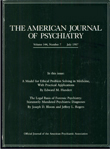Mental Illness in Adults With Fetal Alcohol Syndrome or Fetal Alcohol Effects
Abstract
OBJECTIVE: The authors' goal was to use structured clinical interviews to characterize the type and frequency of mental illness in adults with fetal alcohol syndrome or fetal alcohol effects. METHOD: Twenty-five subjects who met criteria for fetal alcohol syndrome or fetal alcohol effects, who were older than 18 years old, and who had an IQ of greater than 70 were interviewed with the Structured Clinical Interview for DSM-IV Axis I Disorders and the Structured Clinical Interview for DSM-III-R Personality Disorders. RESULTS: Eighteen of the 25 subjects had received psychiatric treatment. The most common axis I disorders were alcohol or drug dependence (15 subjects), depression (11 subjects), and psychotic disorders (10 subjects). The most common axis II disorders were avoidant (six subjects), antisocial (four subjects), and dependent (three subjects) personality disorders. CONCLUSIONS: This study suggests that adults with fetal alcohol syndrome or fetal alcohol effects suffer from substantial mental illness.



